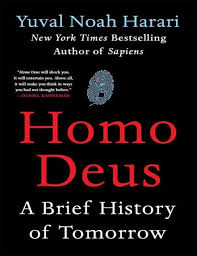A Brief History of Tomorrow | Book by Yuval Noah Harari

Yuval Noah Harari is an Israeli historian and author known for his bestsellers “Sapiens,” “Homo Deus,” and “21 Lessons for the 21st Century.” He explores human history, technology, and future challenges. Harari, a professor at the Hebrew University of Jerusalem, significantly influences public discourse and academic discussions in Israel with his insights into history and the future.
US vs THEM, but what about ME?
Review By: Joel Lovely
Who should read this book ?
Homo Deus is a thought-provoking book, discussing the evolution of human civilization since the era of hunter-gatherers. Yuval Noah Harari uses his extensive knowledge in subjects such as political ideologies, religion, anthropology, and history.
Before:
Having read his other book, “Sapiens,” and remembering the shock I felt, I decided to read “Homo Deus.”
Conclusion:
A question that has been irritating me since the past year has been, “What is the meaning of life?” It is particularly frustrating because this question seems to be answered everywhere by everyone. If you believe in a religion, it makes the thought seem so dumbfounded; obviously whatever the holy scripture says. You might look up to your parents, and they might say a mundane answer similar to the traditional answer. Influencers and friends might say something like, “Ball is life,” “The friends you meet,” etc. This question is HARD.
In a world now built up with screens, it’s easier now than ever to hate yourself. Our bodies weren’t meant for all the comparisons, and I don’t believe a single entity can tell you exactly how to live your life. Speaking from a Catholic background, I was taught that everyone has “good” in them, and sometimes the devil brings out the “bad.” But this is blinding the fact of human nature. Moreover, if you believe in Catholicism, you can’t believe in evolution, anthropology, and even certain parts of astrology. Yuval Noah Harari talks about spirituality as one’s inner journey not defined by some tangible entanglement such as how many times I pray the rosary. My answer to “What is the Meaning of Life” is connected with science, religions, mixed in with a close-knit group of friends, and constantly seeking new ways to expand on it.
I’ve decided to read “Homo Deus” on my vacation trip to India, particularly interesting since this book talks about social and political ideologies. I experienced a different ideology while reading this book, connecting this new experience with my past, which made the experience quite lasting. Born and raised in America with the joys of liberty and capitalism, looking back at my life, I felt I was a narcissistic kid always wanting some new toy. Growing older, the need to post, and this personally turning into an ego problem. I remember the issues I’ve faced: social media addiction, media addiction, and concentration struggles. A result of the system against the younger generation because the culture basically takes your attention away, resulting in an unconscious presence of mainstream marketing on the consumer. I’m currently on vacation in India, and I’ve been places and seen people interacting with other people, walking, the number of local shops. I’m even shocked to say that there isn’t some monopolization of fast food shops around the corner of every street. India has over 700+ languages, where people feel connected in a way, reminding me of how we must have lived in the past when people didn’t have transportation at the hymns of our fingertips and globalization. India’s political ideology of the caste system still lives on in the people. The struggles they face, they pray to a god for strength because in a system so cruel with overpopulation, they don’t have the benefit of child support which we abuse. The nationalism is different here than in America. Indians are proud of their nationality mostly because they don’t alienate themselves. APIDA (Asian Pacific Islander Desi American Awareness Month) in the United States is a joke. In short, a celebration of Asian Americans for building the American railroad system and for South Asians, nothing really. America was built on colonization on the backs of African American men and women, who deservingly do deserve their applause, but people from all nationalities do their part to secure this country, like WWII and the race for building the atomic bomb built on the backs of immigrants. To be honest, American nationality feels like a high school and so many more differences. US VS INDIA, the difference is real where do I fit in?
Yuval Noah Harari’s book “Homo Deus” wasn’t the best book I read, and it fell short of what “Sapiens” did so well, but what I will take out from it was how I look at human civilization and my place in the world.